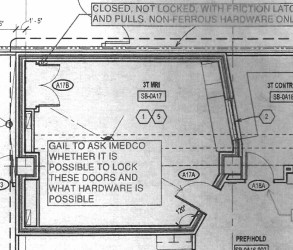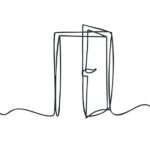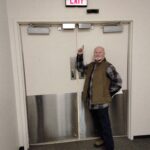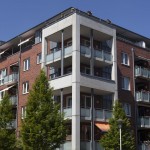 I’ve never been able to get a thorough answer on this one, so hopefully someone out there has this information and is willing to share.
I’ve never been able to get a thorough answer on this one, so hopefully someone out there has this information and is willing to share.
When you are specifying/supplying hardware within a room housing MRI equipment, such as the pair of doors to the small closet in this partial plan, what base material is acceptable in order to prevent the hardware from affecting the magnetic field? Is some iron content ok, or none at all? How do we guarantee that every component of every piece of hardware is acceptable?
I’ve heard several suggestions in the past…
- brass/bronze hardware?
- stainless steel hardware?
- hardware with no metal whatsoever?
- hardware supplied “by others”?
One of my coworkers also pointed out this tragic incident, where a child was killed when an MRI machine pulled an oxygen tank across the room, fracturing the boy’s skull and causing a brain injury. We need to get it right.
WWYD?
You need to login or register to bookmark/favorite this content.





Great questions, Lori!
I do not have an official answer for you, but I have specified hardware for this kind of situation a couple times. The information I’ve received from architects and through research online has pointed to the base metal not being a concern. The reasons are that the system is able to accommodate for interference within the magnetic field and algorithms are used to take care of this.
In regards to the magnetic pull, I think that should be our greatest concern. Unfortunately, I don’t have any great answer other than using hardware that is fastened appropriately. Again, I haven’t received any specific information on requirements to that affect.
I have been informed that these rooms are a modular unit that is dropped into the require area and that all material inside the module is supplied by the manufacturer. We do not provide any doors, frames or hardware due to the non-ferrous requirement. I have had jobs where they wanted to add a pair of closet doors per above after the unit was already installed and I refused to price anything and did not get any push back from the contractor.
When i had to get replacement hardware for our main doors to the MRI room i was told there was no need for special hardware. The doors are radio shielded with copper that’s the consistency of steel wool. One door on ours has a standard simplex lockset and the other has a Corbin lever. These are exterior doors though so they may be a little further away.
As a regulator of health care facilities, I have never heard of door hardware affecting the magnetic field of an MRI. However, especially at the little storage doors, should be non-ferrous. Brass/bronze seems to be a good choice.
1. The installer of the MRI will have recommendations about what to use if they don’t supply their own materials.
2. The primary concern appears to be that the strength of the magnet could eventually pull any ferrous material out of the door.
Could the old Schlage C-series have answered the call? (Am I recalling that right? All brass marine hardware?)
Also, I have heard stories about MRIs killing people via extreme, high-poered magnetism, but have never been able to confirm any of them.
i thought the “C” series was all stainless steel… !
Aren’t most MRI doors/hardware supplied by the MRI manufacturer?
I would think all non ferrous hardware would do the trick, and you could test the theory with a big magnet. I haven’t had any issues with this situation yet so I don’t have any references, but I am interested to know.
Like Joe stated, the unit I worked on in new construction was a “leased” drop in unit and the unit came complete with door hardware. In this case it was a Schlage single cylinder deadbolt and was not keyed to the building master.
Our door was provided by GE with the MRI equipment. It has a roller latch and what appears to be a standard Schlage deadbolt.
Our MRI room also has quite a bit of casework by the GC, which has standard stamped steel Euro-style hinges. All the drawings including the casework details went through GE for the OK.
I worked in the hospital that had the O2 tank accident. It was about fifteen years ago.
As David, John, Joel, Ronald, and Patrick have stated, more often than not, the provider of the MRI unit usually sets up the MRI room, including doors & hardware. But, having said that, the MRI room that was the scene of that accident had an in-swinging solid wood door with a Corbin/Russwin old-style iron cased mortise lockset with 26D plated brass roses and knobs, and an iron-cased door closer (but the closer was mounted outside the door a la parallel arm). I don’t recall the MRI having any effect on that door, as the door closer never failed to close the door.
The other consideration is where the gauss lines of the unit fall within the room. They are generally kidney shaped and can help understand where non-ferrous metals would be required. I try to keep the 5 gauss line completely within the room and away from all doors and walls. That helps make sure the hardware isn’t an issue.
I have heard the notion that ferrous metals can be used inside the room as the algorithms can account for them, but that is generally metal studs, steel structure, etc. Smaller items that move, like door hardware, are best kept out of the 5 gauss line.
Hi, Marvin! That’s the most useful piece of information I’ve ever heard about designing around MRIs. Thank you!
I had installed doors frames and hardware in an MRI room some time ago and I agree and believe if the hardware in the room being used is magnetic eventually it will start to come loose or fail, to back up my opinion I remember what happened the first time walking past the unit and it scared the heck out of me…my holstered hammer flicked up to 90 degrees and yanked me hard towards the MRI. Believe me when I tell you the next couple trips past it I kept my distance. Funny memory …for the rest of that day while installing I was really worried that after all my years working with metal,grinding,drilling,cutting that old metal splinters under my skin were suddenly going to decide to come out!
-Thankfully no
lol ! i can just picture that !
If needed to lock, What about Keyed flush bolts? I have seen cast & brass and the cylinder is Brass. Some of the SFIC are all brass including the driver pins and the core is brass. Some springs are stainless but will they really have an impact.
We used to use either brass/bronze hardware, or stainless steel. Most MRI machines can be “tuned” to a very small area of the room, and not be affected by other static items such as hinges and door jambs. (before that, we used to use stainless steel studs with stainless fasteners). Generally the placement of the machine can control what items are susceptible. This may not be an issue anymore with newer machines — the first project of this type I worked on was more than 30 years ago and the technology has dramatically changed since then.
well, in recent times, such small items as drawer and cabinet locks that are used in mri spaces
have been built.. OLYMPUS makes some.. worth looking into into in terms of metallurgy…
It’s virtually impossible to eliminate metal in construction. MRI reps have told me that it’s not really necessary; the problem is metal that can move. Wall framing, fasteners, steel doors and frames, ducts, ceiling grid, and so on are fixed, so they’re no problem. Also, the two common types of stainless steel – Type 304 and Type 316 – are non-magnetic.
As for hardware, we specify brass or stainless steel hinges and latch sets. Same for casework door and drawer hardware, but we don’t use drawer slides with ball bearings. Normally they wouldn’t be a problem, but if the slide comes loose you could have ball bearings flying around.
Incidentally, the reps would not say any of this in writing; their basic rule is “no steel.”
The first magnetic imaging project I worked on, in the ’80s, was at the U of Minnesota. At that time, the process was called NMR, for nuclear magnetic resonance imaging. Shortly thereafter, the name was changed to MRI because patients were uncomfortable with anything “nuclear.” That particular project might have been experimental as it was in a small stand-alone structure, rather than deep in the bowels of a hospital. We had to design the parking lot to keep vehicles a minimum distance from the NMR so they wouldn’t affect the magnetic field as they arrived and departed.
I worked on a metal assay lab for another UM project. The researcher didn’t care about magnetism, but he would allow no metal within the room. The casework had to be glued, and the door and door frame were wood. I found fiberglass hinges for the door and designed a lever and latch made of Plexiglas.
Projects like these are a lot more fun than the same-thing-we-did-before type!
Thanks Sheldon!
– Lori
Interestingly enough “The Construction Specifier” magazine has sponsored ad from Olympus for their non-magnetic cabinet locks for MRI areas.
http://www.constructionspecifier.com/specifying-non-magnetic-cabinet-locks-for-medical-mri-areas/?utm_campaign=sponsored&utm_medium=email&utm_source=newsletter&utm_content=news
The problem with magnetic materials in an MRI scan room is associated with the potential need to replace something, i.e. broken hinge on a cabinet door. A super conductive magnet can be “turned off”, but it is very expensive to do so. The process of turning it off is called quenching. All of the liquid gases (nitrogen and/or helium) used to keep it cold must be released. Starting the magnet up again requires filling the magnet again with liquid gases. This can cost upwards of $50,000. That makes for an extremely expensive hinge.
Note to locksmiths and others,
If you work around grinders, it is very possible to have a tiny scrap of steel embedded in your skin or eye from years back. The body heals it in and it sits — until the MRI pulls it thru your body. In muscle this is just painful, but in your eye it is worse. My doctor sent me for an xray first to look for these before doing an MRI.
Hi Lori,
I used to build MRI cage for MRI room, the hardware for the door must be made from Titanium (very expensive) or pure aluminium or pure copper. These material are anti magnetic.
If for anti microbial (if requested, usually not necessary for MRI room unless it’s for MRI surgery room) we can coat the hardware with anti microbial coat.